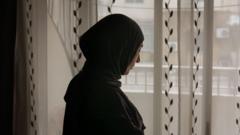Rihab Faour is no stranger to fleeing. Since the onset of the Israeli-Hamas conflict in October 2023, she has had to escape the bombings not once, not twice, but four times, as the violence has permeated deeper into Lebanon, leaving her family more vulnerable with each move. Her journey began when Hamas attacked Israel, prompting retaliations from Hezbollah, escalating tensions that led to bombs raining down in her hometown.
Rihab, a 33-year-old mother, first sought refuge in her parents' house in Dahieh, a suburb of Beirut, with her husband Saeed and their two daughters, Tia and Naya. Initially, life seemed to return to a semblance of normalcy, even as online schooling replaced traditional classrooms for the girls. Excitement grew as Rihab enrolled them in a new school and bought them new uniforms. However, their hopes were dashed when Israeli bombings began to target even the neighborhoods of Beirut.
Fleeing once again, the family moved to Jnah, but after a dangerous air strike, they found themselves squeezed into a house with 17 others in Barbour, which provided some fleeting joy for Tia and Naya as they played with cousins. Rihab recalls an emotional moment when she struck a deal with them: one night at the new apartment in Basta before quickly returning to the familiar chaos of family playdates.
Tragically, on October 10, 2023, a U.S.-made JDAM bomb hit their newly rented apartment shortly after their arrival. The strike, intended for a senior Hezbollah figure, instead claimed the lives of Rihab's husband and two daughters, leaving Rihab seriously injured. She woke up in a hospital, where the grim news about her family was slowly revealed, confirming the loss that would forever alter her life.
Six weeks post-attack, Rihab is physically recovering with metal screws in her spine and arm. Still grappling with grief, she describes her daughters' personalities vividly, sharing fond memories of Tia's delight with her grandparents and Naya's attachment to her mother. The chaos of war seems distant in the warmth of her memories, contrasting sharply with the tremendous void left in the wake of their deaths.
As her family members buried the quickly-decaying bodies of her husband and daughters in makeshift graves, Rihab's pain was compounded by the ongoing conflict. The cemetery where her loved ones rested was also subjected to the relentless bombing, painting a picture of a war that shows no mercy, even in death.
Amidst a recently announced ceasefire allowing people to return to their villages, Rihab finds herself unable to leave her temporary home due to her injury. As joy spreads across Lebanon with the ceasefire, questions arise about the nonchalant survival of the intended bombing target, Wafiq Safa, further intensifying the anguish for families like Rihab’s who have met with tragic loss.
Rihab is tentatively considering reviving her educational pursuits from before her marriage, a reflection of her need to reconstruct her life after unimaginable loss. In searching for purpose during her long, painful days, she embodies the resilience of many who continue grappling with the ramifications of conflict in the Middle East.
















